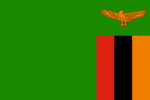This article has multiple issues. Please help improve it or discuss these issues on the talk page. (Learn how and when to remove these messages)
|
Despite several steps taken by the previous government in order to fight corruption in Zambia, there has not been a dramatic improvement in the public perception of anti-corruption efforts over the past years. Corruption remains pervasive in the country, yet in April 2014 the Business Anti-Corruption Portal reported that the situation in Zambia is relatively better than that of other countries in the region.
On Transparency International's 2023 Corruption Perceptions Index, Zambia scored 37 on a scale from 0 ("highly corrupt") to 100 ("very clean"). When ranked by score, Zambia ranked 98th among the 180 countries in the Index, where the country ranked first is perceived to have the most honest public sector. For comparison with worldwide scores, the best score was 90 (ranked 1), the average score was 43, and the worst score was 11 (ranked 180). For comparison with regional scores, the average score among sub-Saharan African countries was 33. The highest score in sub-Saharan Africa was 71 and the lowest score was 11.
Unnecessarily long and complicated administrative procedures are common in Zambia's business environment, leading many companies to operate in the informal sector. The risk of widespread use of facilitation payments is also high due to the bureaucratic procedures for obtaining licences.
Britain, Finland, Ireland and Sweden stopped their financial aid which was $34 million to Zambia due to corruption and financial mismanagement in 2018. A year later, Britain urged Zambia to take serious measures to fight corruption to get financial assistance.
Notes
- Angola, Benin, Botswana, Burkina Faso, Burundi, Cameroon, Cape Verde, Central African Republic, Chad, Comoros, Democratic Republic of the Congo, Djibouti, Equatorial Guinea, Eritrea, Ethiopia, Gabon, Gambia, Ghana, Guinea, Guinea-Bissau, Kenya, Lesotho, Republic of the Congo, Swaziland, Liberia, Madagascar, Malawi, Mali, Mauritania, Namibia, Niger, Nigeria, Rwanda, Sao Tome and Principe, Senegal, Seychelles, Sierra Leone, Somalia, South Africa, South Sudan, Sudan, Tanzania, Togo, Uganda, Zambia, and Zimbabwe.
See also
References
- "The ABCs of the CPI: How the Corruption Perceptions Index is calculated". Transparency.org. Retrieved 16 March 2024.
- "Corruption Perceptions Index 2023: Zambia". Transparency.org. Retrieved 16 March 2024.
- "CPI 2023 for Sub-Saharan Africa: Impunity for Corrupt Officials, Restricted Civic Space & Limited Access to Justice". Transparency.org. Retrieved 16 March 2024.
- "Zambia Corruption Profile". Business Anti-Corruption Portal. April 2014. Archived from the original on 15 July 2015. Retrieved 14 July 2015.
- "Britain urges Zambia to fight corruption to unlock aid". Reuters. 2019-08-27. Retrieved 2019-08-28.
| Corruption in Africa | |
|---|---|
| Sovereign states |
|
| States with limited recognition | |
| Dependencies and other territories |
|
